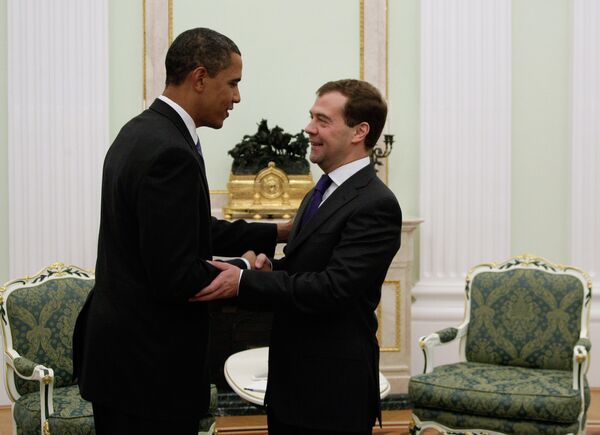MOSCOW. (RIA Novosti political commentator Andrei Fedyashin) - U.S. President Barack Obama is facing "a perfect storm of a week amid foreign policy challenges," which includes a meeting with Russian President Dmitry Medvedev on September 23 and chairing a special UN Security Council session on non-proliferation and disarmament.
Its goal is to exchange more radical disarmament by nuclear powers in return for wider global efforts to prevent further proliferation.
It is logical that the Russian and the American presidents will meet ahead of the General Assembly session on nuclear weapons to discuss progress in the drafting of a new bilateral strategic arms reduction treaty. The previous treaty will expire on December 5, 2009.
If Moscow and Washington agree to cut their nuclear weapons to 1,500-1,675 charges and 500 delivery vehicles, as Russia has proposed, it will set a very good example for other nuclear and threshold countries.
Their ability to agree on this sensitive issue may influence the attitudes of India, Pakistan, Iran, South Korea and Israel to the 1968 Non-Proliferation Treaty. It may also discourage Israel from delivering a preemptive strike at Iran, and Arab countries from acquiring nuclear weapons.
In short, it is a complex foreign policy formula with a large number of variables.
To put it bluntly, the next week will determine the world's choice between making progress and marking time (or worse still, rolling back) in the sphere of non-proliferation and disarmament. It will definitely determine the future of Russian-American relations, which may become healthier during Obama's presidency than they have been in the past 20 years.
President Medvedev, whose disarmament policy has no opposition in parliament or the country, may help Obama in this undertaking.
I don't mean that he should accept Obama's latest initiatives, in particular the decision to abandon a missile defense scheme in Eastern Europe, unconditionally. These initiatives should be scrutinized, and Russia's Defense Ministry has already done so and expressed its first criticism. However, this is a trifle compared to solid opposition to Obama's initiatives in the United States.
If Medvedev accepts Obama's initiatives as a basis for further talks and supports some of his non-proliferation proposals, he will ensure advantages for Russia, which does not want to have nuclear countries on its southern and eastern borders.
And it would be absolutely inadvisable to reject Obama's proposals with regard to the European ABM, even though they are incomplete.
Obama will have a difficult week, especially since all foreign policy issues on his agenda (nuclear arms cuts, the non-proliferation regime, and normalization of relations with Russia) were declared during his election campaign a year ago as the fundamental elements of his foreign policy strategy.
The number of opponents of that strategy is growing. In particular, the Pentagon is resisting his plans to reduce nuclear weapons. According to the press, Obama has rejected the Pentagon's first draft of the Nuclear Posture Review as being too timid, and has called for a range of more far-reaching options consistent with his goal of eventually abolishing nuclear weapons altogether.
The United States currently has 2,600 strategic nuclear warheads on combat duty, another 2,500 in reserve, and 4,000 more waiting to be dismantled.
Also, the Non-Proliferation Treaty is coming up for a regular five-year review next May. The number of nuclear powers has grown to nine from five at the time of its signing in 1968. The treaty has nevertheless slowed down proliferation, but if it fails to be reviewed again in 2010 it may not live to see the year 2015, even though it is of an unlimited duration.
The consequences of this potential failure would be unpredictable, especially in the Middle East.
In other words, Obama badly needs Medvedev's help.
The opinions expressed in this article are the author's and do not necessarily represent those of RIA Novosti.



